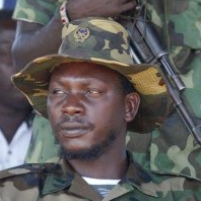$900 Million Later, International Criminal Court Gets Its First Conviction
Thursday, March 15, 2012
 Thomas Lubanga (AP Photo)
Thomas Lubanga (AP Photo)
Ten years after being established and almost $1 billion in costs, the International Criminal Court (ICC) has made its first conviction, much to the delight of human rights advocates.
But critics contend the ICC is too costly and delivers too little. With a staff of more than 760, the court uses about $140 million each year, and has burned through around $900 million during its brief history. Some countries have begun discussing cutting the ICC’s budget.
Supporters counter that the ICC’s work is difficult and demands highly-skilled professionals. It must cover staff salaries, building rental, international travel, investigations in hostile areas, translators and legal aid for defendants and victims.
For those who argue that justice has no price, the handing down of the ICC’s first conviction helps them demonstrate the importance of fully supporting the court.
Thomas Lubanga, a rebel leader from the Democratic Republic of the Congo, was found guilty this week of recruiting child soldiers between the ages of 7 and 15 for warfare. His group, the Union of Congolese Patriots (UPC), was involved in ethnic massacres, torture and rape. His trial lasted three years. Human rights organizations hailed the conviction, saying it firmly establishes the use of children in war as an international crime.
They also say the conviction of Lubanga should increase pressure on countries to bring Joseph Kony, the leader of the Lord’s Resistance Army, to justice before the ICC for years of turning children into killing machines.
The ICC is currently investigating war crimes in six other countries— northern Uganda, the Darfur region of Sudan, the Central African Republic, Kenya, Libya, and Côte d’Ivoire—and is conducting preliminary investigations in Afghanistan, Colombia, Georgia, Nigeria, and Honduras.
The U.S. remains an official non-party to the ICC, which can prosecute people only when countries are unwilling or unable to try individuals for war crimes or acts of genocide.
-Noel Brinkerhoff
To Learn More:
Ten Years, $900m, One Verdict: Does The ICC Cost Too Much? (by Jon Silverman, BBC News Magazine)
Congolese Warlord Convicted of Using Child Soldiers (by Marlise Simons, New York Times)
ICC: Landmark Verdict a Warning to Rights Abusers (Human Rights Watch)
U.S. Supports International Criminal Court for First Time (by Noel Brinkerhoff and David Wallechinsky, AllGov)
- Top Stories
- Unusual News
- Where is the Money Going?
- Controversies
- U.S. and the World
- Appointments and Resignations
- Latest News
- Trump to Stop Deportations If…
- Trump Denounces World Series
- What If China Invaded the United States?
- Donald Trump Has a Mental Health Problem and It Has a Name
- Trump Goes on Renaming Frenzy






Comments